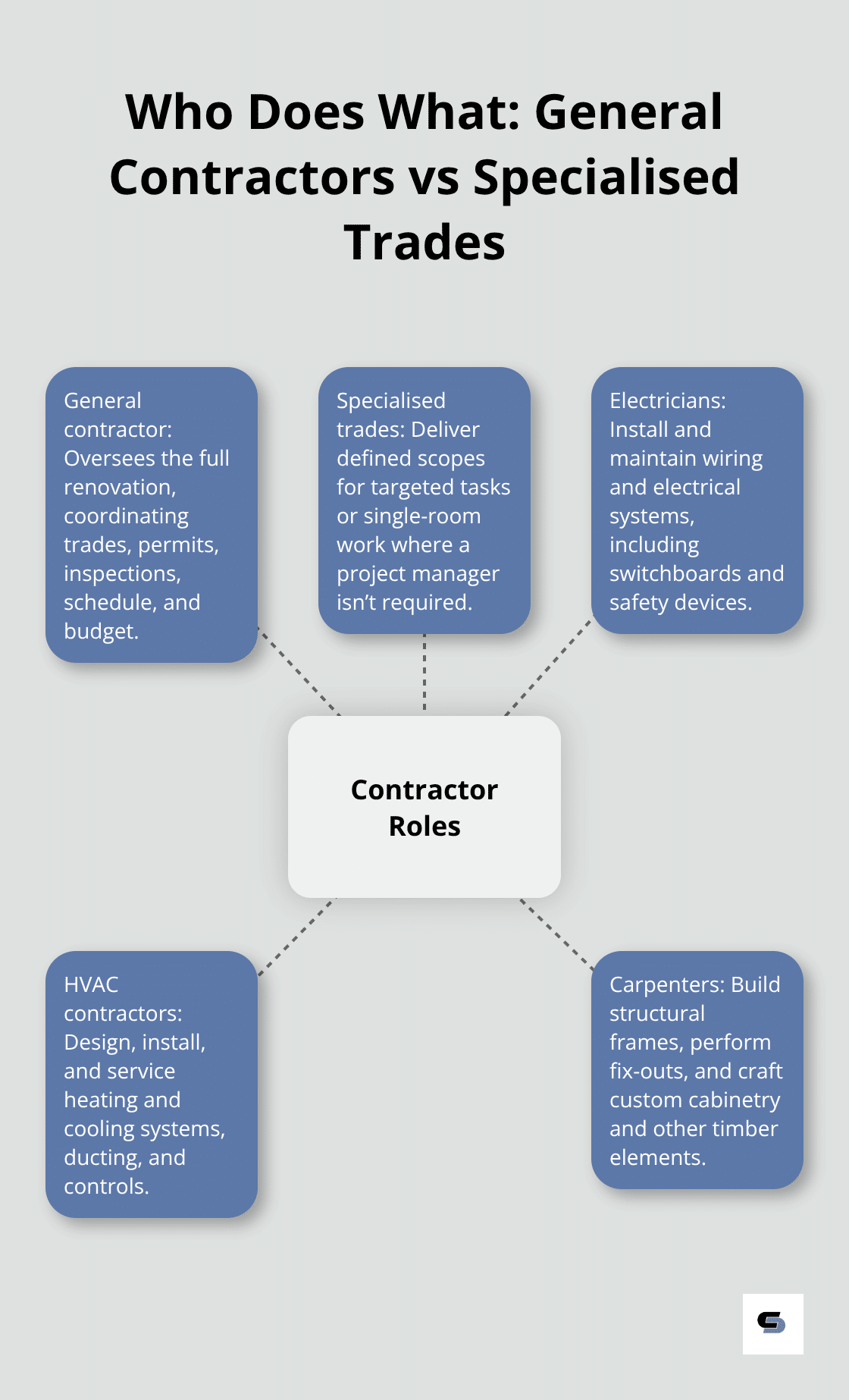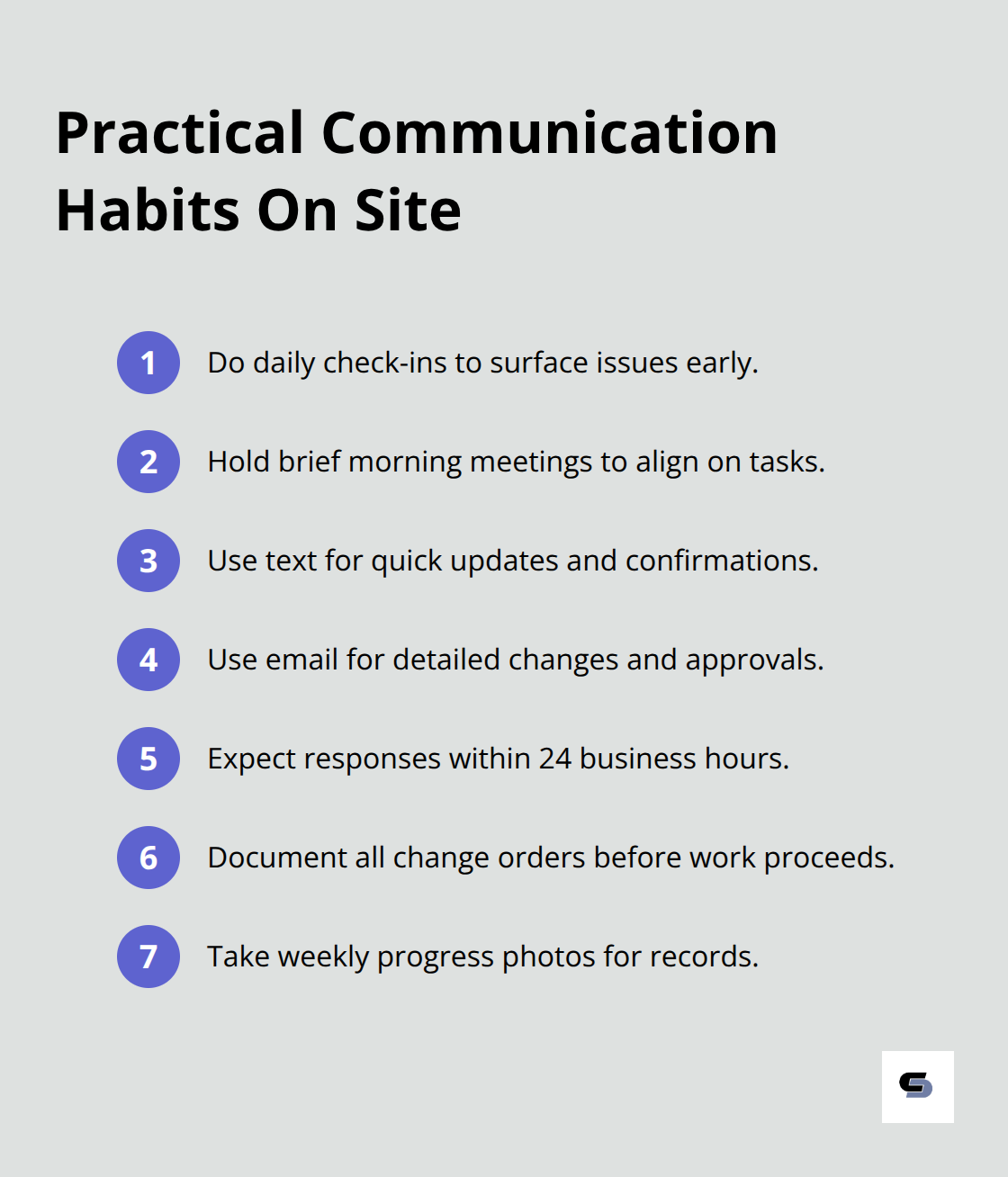What Is a Home Improvement Contractor?
Home improvement projects can transform your living space, but they often require professional expertise. Understanding what is a home improvement contractor and their role helps you make informed decisions for your renovation needs.
We at Cameron Construction know that choosing the right contractor makes the difference between a successful project and a costly mistake. The right professional brings skills, experience, and project management expertise to turn your vision into reality.
What Services Do Home Improvement Contractors Provide
Home improvement contractors offer three main service categories that cover every aspect of residential renovation and construction. General contractors manage entire projects from start to finish and handle everything from initial plans to final cleanup. They coordinate multiple trades, obtain permits, and oversee timelines while they maintain quality standards throughout the process. The majority of NAHB builder members consist of small home building firms who build less than 10 homes annually and have fewer than 10 employees, which reflects the complexity of modern renovation projects.
General Contractors vs Specialised Trades
General contractors function as project managers who hire and coordinate specialised subcontractors. They handle permits, inspections, and material orders while they maintain overall project responsibility. Specialised trades focus on specific skills like electrical work, plumbing, or carpentry.

Electricians handle all wires and electrical systems, while HVAC contractors manage heat and cool installations. Carpenters specialise in wood-related tasks from frames to custom cabinets. The choice between a general contractor and individual specialists depends on project scope (single-room renovations often work well with specialised trades, while whole house projects require general contractor coordination).
Project Management and Quality Control
Professional contractors provide structured project management that prevents costly delays and mistakes. They create detailed timelines, coordinate material deliveries, and manage inspection schedules. ROI in home improvement refers to the percentage of your renovation costs you can expect to recoup when you sell your home. Contractors also handle unexpected issues like structural problems or code violations that can derail amateur projects. They maintain relationships with suppliers and secure better material prices and faster delivery times. Quality control remains their primary responsibility as they catch problems before they become expensive repairs.
Common Home Improvement Services
Most contractors offer kitchen and bathroom remodels, which represent the highest-value home improvements. They also handle exterior work like roof replacement, siding installation, and deck construction. Interior services include flooring installation, drywall repair, and paint application. Many contractors specialise in energy-efficient upgrades (such as window replacement and insulation improvements) that reduce utility costs. Landscaping contractors enhance outdoor spaces through plant installation and hardscape features.
With these services in mind, the next step involves selecting the right professional for your specific project needs.
How Do You Find the Right Contractor
Start with licence verification through your state’s contractor licensing board database. Licensed contractors carry liability insurance that protects you from accidents and property damage during construction. The National Association of Home Builders reports that 90% of homeowners consider professional engagement essential for major improvements. Request insurance certificates directly from contractors and verify coverage amounts exceed your project value.

Bonded contractors provide additional financial protection if they fail to complete work or pay subcontractors.
Check Credentials and Insurance Coverage
Verify each contractor’s licence status remains current and active through official state databases. Contact their insurance provider to confirm policy details and coverage limits match your project requirements. Professional contractors maintain both general liability and workers’ compensation insurance to protect all parties involved. Ask for proof of bonding if your project exceeds $10,000 in total value. These credentials separate legitimate professionals from unlicensed operators who may leave you liable for accidents or incomplete work.
Research Past Work and References
Examine completed projects similar to your renovation scope and budget range. Request contact information for three recent clients and ask specific questions about timeline adherence, budget management, and problem resolution. Check online reviews across multiple platforms but focus on detailed feedback rather than star ratings alone. Visit active job sites to observe work quality and crew professionalism. Contractors with 10+ years of local experience understand regional building codes and weather challenges better than newcomers.
Compare Detailed Proposals
Collect written estimates from three contractors that itemise materials, labour, permits, and cleaner costs. Proposals should specify material brands, installation methods, and warranty terms. Avoid contractors who request large upfront payments or use door-to-door solicitation tactics. Compare hourly labour rates and material markup percentages between proposals. Professional renovations provide significant value when completed properly. Schedule proposal meetings at consistent times to maintain fair evaluation conditions.
Once you select your contractor, the next phase involves establishing clear communication protocols and project expectations to maintain smooth progress throughout construction.
How Do You Manage Your Contractor Relationship
Successful contractor relationships start with documented agreements that specify completion dates, material brands, and payment schedules. Professional contractors provide detailed written contracts that outline every project phase with specific deadlines. Clear timelines prevent delays that cost homeowners money and create frustration. Your contract should include start dates, milestone completions, and final inspection schedules.
Payment terms must align with project phases rather than upfront lump sums. Professional contractors typically request 5% deposits with progress payments tied to completed work stages. Never agree to pay more than 50% of total costs before work completion.
Establish Communication Protocols
Daily check-ins prevent small issues from becoming major problems during construction. Schedule brief morning meetings to review progress and address concerns before work begins each day. Text messages work best for quick updates while email handles detailed discussions about material changes or timeline adjustments.

Professional contractors respond to communications within 24 hours during business days. Document all change orders in writing before work proceeds to avoid payment disputes later. Take progress photos weekly to track work quality and completion stages. These photos become valuable references if problems arise after project completion.
Handle Changes and Problems Effectively
Change orders increase project costs by an average of 10-20% according to construction industry data. Approve changes in writing with specific cost breakdowns and timeline impacts before contractors proceed with modifications. Weather delays, permit issues, and material shortages cause most construction delays beyond contractor control.
Budget an additional 5-10% contingency for unexpected expenses (such as structural repairs or code compliance updates). Address quality concerns immediately rather than wait until project completion when corrections become more expensive and disruptive. Quick problem resolution maintains project momentum and prevents costly rework. For major renovations like bathroom projects, consider financing options to manage costs effectively.
Final Thoughts
Professional contractors transform renovation projects from stressful experiments into structured successes. Licensed professionals prevent costly mistakes while they deliver quality results within agreed timelines. They handle permits, coordinate trades, and manage unexpected challenges that amateur projects cannot overcome.
The benefits extend beyond technical skills to include supplier relationships that secure better material prices and faster delivery schedules. Professional contractors carry insurance protection that shields homeowners from liability during construction. Quality contractors also provide warranties that protect your investment long after project completion.
Your next step involves research into local contractors who match your project scope and budget requirements (verify licences, check references, and compare detailed proposals before selection). Cameron Construction brings decades of Melbourne renovation experience with proven project management that delivers results on time and budget. Start your contractor search today to transform your home improvement vision into reality through professional expertise.






